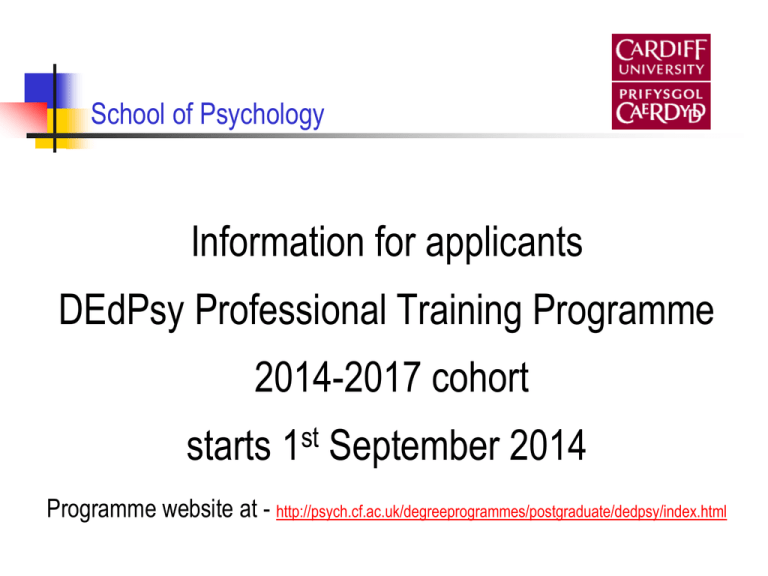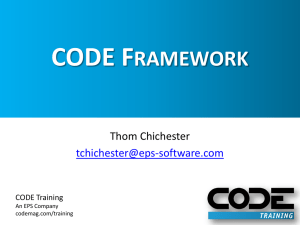Professional Training - School of Psychology
advertisement

School of Psychology Information for applicants DEdPsy Professional Training Programme 2014-2017 cohort starts 1st September 2014 Programme website at - http://psych.cf.ac.uk/degreeprogrammes/postgraduate/dedpsy/index.html Main Questions What does the Cardiff three-year DEdPsy Initial Training Programme provide? What are the main features of the Cardiff DEdPsy selection process? What are the entry requirements for the Cardiff DEdPsy Professional Training Programme starting September 2014? What procedures govern applications for places? What are the funding arrangements? How can you find out more? 2 What does the Cardiff DEdPsy Initial Training Programme provide? - 1 The Cardiff Programme is based on: the Health and Care Professions Council’s (HCPC’s) Standards of Education and Training (SET); the HCPC’s Standards of Proficiency (SoP); the British Psychological Society’s (BPS’s) standards for Doctoral programmes in educational psychology in England, Northern Ireland and Wales; and The BPS’s Required Competencies (RCs) for educational psychologists who are eligible for Chartered Membership. 3 What does the Cardiff DEdPsy Initial Training Programme provide? - 2 Trainees who successfully complete the programme will be eligible: for Chartered Status with the BPS; and to apply for registration with the HCPC as an educational psychologist, which is an essential requirement for practitioner psychologists. However, applicants should note the following. Applicants will be expected to meet the HCPC’s recommendations with regard to fitness to practice (HCPC Guidance on Health and Character, 2009). These recommendations include the requirement that students’ health should not “affect their ability to practise safely and effectively” (p.21). 4 What does the Cardiff DEdPsy Initial Training Programme provide? - 3 Cardiff University has in place a Policy for Determining Applicants’Fitness to Practise and Eligibility to Pursue Regulated Programmes of Study. This policy will be followed where information is disclosed or received about applicants, which suggests that a fitness to practise assessment is required. Information is available at http://www.cf.ac.uk/regis/general/applyonline/APPLICANT%20F TP%20POLICY%20Senate%20approved.docx What does the Cardiff DEdPsy Initial Training Programme provide? - 4 Eligibility to enrol on the programme, if offered a place, is dependent upon satisfactory completion of an Enhanced Disclosure and Barring Service (DBS) Check, i.e., one that does not reveal any information that suggests a trainee would be unsuitable for work with children, young people and vulnerable adults. Those offered a place on the programme must agree to show their DBS certificates to the Programme Administrator, for checking. The HCPC carries out its own health and character checks to determine whether individuals are fit to practise and can be included on the Register. So passing all elements of this programme does not guarantee automatic inclusion on the HCPC’s Register. 6 What does the Cardiff DEdPsy Initial Training Programme provide? - 5 The programme is designed to provide a wideranging overview of issues and practices in educational psychology. There is a balance struck between developing professional skills and competencies and developing an understanding of the theories and process issues, which inform good practice. 7 What does the Cardiff DEdPsy Initial Training Programme provide? - 6 The programme consists of: university-based sessions (blocked weeks); investigative visits (pre-induction weeks) and practical fieldwork placements in Local Authority settings and Educational Psychology Services (blocked weeks); reading and directed study (blocked weeks); research projects, both collaborative and individual; and private study time. 8 What does the Cardiff DEdPsy Initial Training Programme provide? - 7 Arrangements across the three years are likely to be as follows (approximate percentages). Year 1 - University - including research (60%) Fieldwork - including investigative visits (40%) Year 2 - University - (33%) Fieldwork - including research (67%) Year 3 - University (28%) Fieldwork - including research (72%) 9 Cardiff University - DEdPsy Year Plan for 2013-2014 Term One W/C 1 2/09 Year 1 DS & IVs Term Two Year 2 Year 3 W/C Year 1 Year 2 Term Three Year 3 R & DS R & DS 6/01 U EPS 2 ** EPS 3 * W/C Year 1 Year 2 Year 3 28/04 EPS 1 EPS 2 ** EPS 3 *** 2 9/09 DS & IVs U EPS 3 * 13/01 U EPS 2 EPS 3 5/05 EPS 1 EPS 2 EPS 3 3 16/09 DS & IVs U (2w) EPS 3 20/01 U EPS 2 EPS 3 12/05 EPS 1 EPS 2 EPS 3 4 23/09 DS & IVs EPS 2 ** EPS 3 27/01 U EPS 2 EPS 3 19/05 EPS 1 EPS 2 EPS 3 5 30/09 DS & IVs (5w) EPS 2 EPS 3 3/02 U (5w) EPS 2 EPS 3 26/05 R & DS R & DS R & DS 6 07/10 U (Induction) EPS 2 EPS 3 10/02 EPS 1 EPS 2 EPS 3 2/06 EPS 1 (5w) EPS 2 EPS 3 7 14/10 U EPS 2 EPS 3 17/02 EPS 1 EPS 2 EPS 3 9/06 U EPS 2 (6w) EPS 3 (6w) 8 21/10 U EPS 2 EPS 3 24/02 R & DS R & DS R & DS 16/06 U U (Th) U 9 28/10 R & DS R & DS R & DS (1w) 3/03 EPS 1 EPS 2 EPS 3 23/06 U U (Th) U 10 4/11 U EPS 2 EPS 3 10/03 EPS 1 EPS 2 EPS 3 30/06 U (4w) U (Th) (3w) U (3w) 11 11/11 U EPS 2 EPS 3 17/03 EPS 1 EPS 2 EPS 3 7/07 R & DS R & DS R & DS 12 18/11 U EPS 2 EPS 3 24/03 EPS 1 EPS 2 EPS 3 14/07 R & DS (3w) R & DS (3w) R & DS (3w) 13 25/11 U EPS 2 EPS 3 31/03 EPS 1 (7w) EPS 2 (12w) EPS 3 (12w) 14 2/12 U (8w) EPS 2 EPS 3 7/04 R & DS (2w) R & DS (2w) R & DS (2w) 15 9/12 R & DS EPS 2 (11w) EPS 3 (13w) 16 16/12 R & DS (3w) R & DS (3w) U (1w) 48 48 23 29 44 Total EPS days Last day of Term 52 th Friday, 20 December 2013 35 th Friday, 11 April 2014 24 th Friday, 18 July 2014 DS & IVs = Directed Study and Investigative Visits * All EPS 3 weeks in terms 1 and 2 = Monday to Thursday for (Th) = Thesis Work (University-Based) U = University Sessions fieldwork placements and Friday for thesis-related work *** All EPS 3 weeks from 28th April = Monday to Friday for R & DS = Reading and Directed Study ** All EPS 2 weeks = Monday to Thursday for fieldwork fieldwork placements (Thesis submitted on 10th April) Numbers in brackets = number of weeks spent on specific activities placements and Friday for Small Scale Research Project and thesis-related work EPS = Fieldwork Placement Year 1 Total EPS days for 2013-2014 = 59 Year 2 Total EPS days for 2013-2014 = 115 Year 3 Total EPS days for 2013-2014 = 129 What does the Cardiff DEdPsy Initial Training Programme provide? - 8 It is important to note that: the programme begins each year on 1st September; trainees are expected to engage fully in programme activities during all of the weeks listed on the Year Plan (including Reading and Directed Study weeks); and the year ends on the Friday of the last week of term 3 listed on the Year Plan. 11 What does the Cardiff DEdPsy Initial Training Programme provide? - 9 The following themes underpin University-based sessions. Research Methods in Educational Psychology. Processes and Methods of Assessment. The Psychology of Learning: Managing Change. The Psychology of Behaviour: Managing Change. Understanding and Working with Organisations, Systems and Groups: Managing Change. The Role of the Educational Psychologist: Managing Change. 12 What does the Cardiff DEdPsy Initial Training Programme provide? - 10 All trainees on the Cardiff programme: have placements in local authority psychology services in Wales and some counties in southern England, with Welsh placements prioritised (arranged by the programme staff, in consultation with local authorities and trainees themselves) during all three years of their programme and do not need to find employment during years 2 and 3; have three separate fieldwork placements in different local authorities across the full term of the programme; and cannot opt out of these arrangements, for example, to seek employment in any of the three years. 13 What does the Cardiff DEdPsy Initial Training Programme provide? - 11 The tutors have been developing ‘COMOIRA’ - the Constructionist Model of Informed, Reasoned Action. This is an innovative model for applying psychology, where psychological theory and research lie at the centre of a flexible process that can inform all the different tasks in which EPs can become involved. It will be used by the trainees on their fieldwork placements and in group investigations, but is more than simply a fieldwork tool. The programme team is keen to use COMOIRA in all aspects of work on the programme including professional supervision sessions and group consultations. COMOIRA is in a process of dynamic development and will continue to influence all aspects of the programme. 14 COMOIRA References Gameson, J., Rhydderch, G., Ellis, D. and Carroll, H.C.M. (2003). Constructing a flexible model of integrated professional practice: part 1, conceptual and theoretical issues. Educational and Child Psychology, 20, 4, 96115. Gameson, J., Rhydderch, G., Ellis, D. and Carroll, H.C.M. (2005). Constructing a flexible model of integrated professional practice: part 2, process and practice issues. Educational and Child Psychology, 22, 4, 41-55. 15 COMOIRA References Rhydderch, G. and Gameson, J. (2010). Constructing a flexible model of integrated professional practice: part 3, the model in practice. Educational Psychology in Practice, 26, 2, 123-149. Gameson, J. and Rhydderch, G. (2008). The Constructionist Model of Informed and Reasoned Action (COMOIRA). in B. Kelly, L. Woolfson and J. Boyle (Eds.), Frameworks for Practice in Educational Psychology: A Textbook for Trainees and Practitioners. London: Jessica Kingsley. 16 COMOIRA References Electronic copies of the three COMOIRA papers, and the chapter in the Frameworks book, are available on request from the Programme Administrator: Email: dedpsyadmin@cardiff.ac.uk Telephone: 02920 875393 17 What are the main features of the Cardiff DEdPsy selection process? - 1 Two stage selection process Stage 1 Short-listing based upon application forms Stage 2 (Monday 31st March 2014) - A range of selection activities (all day) for short listed applicants. 18 What are the main features of the Cardiff DEdPsy selection process? - 2 The programme team is looking to recruit trainees who: have made good use of their relevant experiences of working with children and young people in education, child care or community settings to prepare themselves for professional training as an educational psychologist of the highest quality; have a good understanding of the needs of children and/or young people, especially in educational contexts; have a good understanding of schools, local authority education systems and/or children’s services, and the broader systems to which they relate; are able to apply psychology appropriately in their work with children, young people and adults; continued… 19 What are the main features of the Cardiff DEdPsy selection process? - 3 The programme team is looking to recruit trainees who: have a good understanding of the key issues and debates in education; have a good understanding of the role and function of educational psychologists; have maintained a keen interest in psychology itself (since the programme will not involve the re-teaching of undergraduate psychology); have a good understanding of the key issues and developments in the profession of educational psychology; have excellent interpersonal skills and manage their interactions with others sensitively; continued… 20 What are the main features of the Cardiff DEdPsy selection process? - 4 The programme team is looking to recruit trainees who: have excellent self-management skills and can demonstrate these skills in stressful and complex situations, e.g., the selection process; can reflect on their own experiences in order to identify salient aspects of learning; are able to communicate effectively to a high standard - orally and in writing; would participate enthusiastically in all aspects of the programme and be open to new learning and experiences; and would also be willing to undertake placements in any area of Wales or in parts of England. 21 What are the entry requirements for the Cardiff DEdPsy Programme starting September 2014? - 1 Currently, applicants must be eligible for the Graduate Basis for Chartered Membership (GBC), formerly the Graduate Basis for Registration (GBR), of the British Psychological Society (BPS) and must provide written confirmation of this with their application forms. To be eligible for GBC applicants must either have: undertaken a qualification in psychology (usually a Bachelor (Honours) degree) which has been approved by the BPS as conferring the Graduate Basis for Chartered Membership (GBC) ; or passed the Society's Qualifying Examination; or undertaken an appropriate Society approved conversion course. Further details can be found on the BPS website. 22 What are the entry requirements for the Cardiff DEdPsy Programme starting September 2014? - 2 Applicants must be able to demonstrate that they have benefited from direct, relevant and appropriate work with children and young people (0 - 19) within educational, childcare or community settings, that has: helped to prepare them for training as an educational psychologist; been sufficient and sustained, showing continuity and commitment; and included being supervised/managed by an appropriate responsible professional. The programme team is not in a position to comment on the suitability of particular experiences. The programme team is most interested in the use applicants have made of their experiences to prepare themselves for training as applied psychologists of the highest quality in education contexts. 23 What are the entry requirements for the Cardiff DEdPsy Programme starting September 2014? - 3 Applicants who undertook their psychology degrees at a university in the UK or Republic of Ireland, and who are unsure whether they are eligible for GBC, should contact their respective course directors who should be able to confirm whether they have GBC or not. A full list of undergraduate accredited courses is available from the British Psychological Society (BPS). Applicants will be required to provide written confirmation of eligibility for GBC. 24 What are the entry requirements for the Cardiff DEdPsy Programme starting September 2014? - 4 Applicants who studied overseas will be required to demonstrate that they are eligible for GBC and should apply to the BPS for Graduate Membership. Eligibility for GBC will be considered automatically when applying for Membership and decisions on both will be communicated at the same time. Please note that applicants are responsible for confirming GBC and applications for Graduate Membership can take several months to process. 25 What are the entry requirements for the Cardiff DEdPsy Programme starting September 2014? - 5 All applicants must have a standard of written and spoken English that will enable them to complete doctoral level written assignments, participate fully in all Universitybased sessions and function competently as trainee educational psychologists in fieldwork placement contexts. The minimum English language level accepted for application to the DEdPsy Programme (where appropriate) is an International English Language Test (IELT) score of 7.5. In addition, during all aspects of the selection process (including scrutiny of submitted application forms), English language proficiency will be monitored and assessed. 26 What procedures govern applications for places? Cardiff University now has a separate application process for places on the Cardiff DEdPsy. Further details are published on our DEdPsy web pages at: http://psych.cf.ac.uk/degreeprogrammes/postgraduate/dedpsy/index.html 27 What are the funding arrangements? - 1 For the 2014-2017 cohort, each funded trainee on the Cardiff DEdPsy programme will receive a training grant/bursary (£12,600) from the Welsh Local Government Association (WLGA) and Welsh Government (WG) for all three years of the programme. No additional funds are provided for travel expenses etc. but many EPSs now pay the costs of travel for journeys that trainees make on EPS business during placement. Trainees on the Cardiff DEdPsy Programme are not employed during any of the three years of their training and, therefore, do not accrue pension and other entitlements during this time. Fees will be paid from WLGA/WG central funds. 28 What are the funding arrangements? - 2 Trainees on the Cardiff DEdPsy programme must successfully complete all programme requirements each year in order to progress to the next year. Funding in a subsequent year depends on successful completion of the previous year. 29 What are the funding arrangements? - 3 The Cardiff DEdPsy programme has now started to offer places to a limited number of candidates who meet all selection criteria and wish to self-fund. Self funders have to pay the full fees for all three years of the Programme. All prospective self funding candidates must meet all of the DEdPsy stringent selection criteria and programme requirements and no special allowances are made for them. 30 What are the funding arrangements? - 4 It is expected that the 3 years of training will be continuous. Any breaks in training will have to be justified and will normally only be allowed in case of: maternity/paternity break; certificated sickness; and some other unavoidable emergency. 31 What are the funding arrangements? - 5 Funded trainees who withdraw from the programme will no longer be eligible for the training grant/bursary and may be required to reimburse all payments made. Funded trainees who withdraw from the programme, or fail to progress, will not be eligible for any further funding under the scheme. Funded trainees who are required to repeat any part of the programme will not be eligible for additional funding for the repeated period. Any trainee who is required to repeat any part of the programme is also likely to have to pay fees for the repeated period. The Cardiff DEdPsy Programme does not offer any interim, exit or aegrotat awards for trainees who do not successfully complete all programme requirements. This includes successful completion of the thesis. 32 What are the funding arrangements? - 6 Upon successful completion of the training programme, ‘funded’ trainees may be required, as is currently the case, to complete two years of employment as an educational psychologist within a Local Authority in England or Wales. Failure to undertake this may result in the recovery of all or a part of the training grant/bursary. In this event, each case would be considered on an individual basis. 33 What are the funding arrangements? - 8 There are currently no conditions attached to the WLGA central funding for trainees on the Cardiff programme However, at any time in the future, this situation could change, resulting in funded Cardiff trainees: having all their fieldwork placements in Wales; and being obliged to apply for vacant EP posts in Wales, and possibly work in Wales, for two years after they qualify. 34 How can you find out more? For information and links to other sites, visit our website at: http://psych.cf.ac.uk/degreeprogrammes/postgraduate/dedpsy/index.html Contact an Educational Psychology Service (EPS) and ask to shadow/interview an EP. Read the journal ‘Educational Psychology in Practice’ which all members of the Association of Educational Psychologists (AEP) receive quarterly and which may also be available in University libraries. Read the journal ‘Educational and Child Psychology’ which members of the Division of Educational and Child Psychology (DECP) receive quarterly and which may also be available in University libraries. 35






